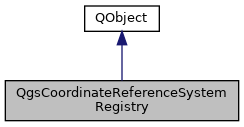A registry for known coordinate reference system (CRS) definitions, including any user-defined CRSes. More...
#include <qgscoordinatereferencesystemregistry.h>

Classes | |
| class | UserCrsDetails |
| Contains details of a custom (user defined) CRS. More... | |
Signals | |
| void | crsDefinitionsChanged () |
| Emitted whenever an operation has caused any of the known CRS definitions (including user-defined CRS) to change. More... | |
| void | userCrsAdded (const QString &id) |
| Emitted whenever a new user CRS definition is added. More... | |
| void | userCrsChanged (const QString &id) |
| Emitted whenever an existing user CRS definition is changed. More... | |
| void | userCrsRemoved (long id) |
| Emitted when the user CRS with matching id is removed from the database. More... | |
Public Member Functions | |
| QgsCoordinateReferenceSystemRegistry (QObject *parent=nullptr) | |
| Constructor for QgsCoordinateReferenceSystemRegistry, with the specified parent object. More... | |
| ~QgsCoordinateReferenceSystemRegistry () | |
| long | addUserCrs (const QgsCoordinateReferenceSystem &crs, const QString &name, Qgis::CrsDefinitionFormat nativeFormat=Qgis::CrsDefinitionFormat::Wkt) |
| Adds a new crs definition as a custom ("USER") CRS. More... | |
| QList< QgsCelestialBody > | celestialBodies () const |
| Returns a list of all known celestial bodies. More... | |
| QMap< QString, QgsProjOperation > | projOperations () const |
| Returns a map of all valid PROJ operations. More... | |
| bool | removeUserCrs (long id) |
| Removes the existing user CRS with matching id. More... | |
| bool | updateUserCrs (long id, const QgsCoordinateReferenceSystem &crs, const QString &name, Qgis::CrsDefinitionFormat nativeFormat=Qgis::CrsDefinitionFormat::Wkt) |
| Updates the definition of the existing user CRS with matching id. More... | |
| QList< QgsCoordinateReferenceSystemRegistry::UserCrsDetails > | userCrsList () const |
| Returns a list containing the details of all registered custom (user-defined) CRSes. More... | |
Detailed Description
A registry for known coordinate reference system (CRS) definitions, including any user-defined CRSes.
QgsCoordinateReferenceSystemRegistry is not usually directly created, but rather accessed through QgsApplication::coordinateReferenceSystemRegistry().
- Since
- QGIS 3.18
Definition at line 39 of file qgscoordinatereferencesystemregistry.h.
Constructor & Destructor Documentation
◆ QgsCoordinateReferenceSystemRegistry()
|
explicit |
Constructor for QgsCoordinateReferenceSystemRegistry, with the specified parent object.
Definition at line 35 of file qgscoordinatereferencesystemregistry.cpp.
◆ ~QgsCoordinateReferenceSystemRegistry()
|
default |
Member Function Documentation
◆ addUserCrs()
| long QgsCoordinateReferenceSystemRegistry::addUserCrs | ( | const QgsCoordinateReferenceSystem & | crs, |
| const QString & | name, | ||
| Qgis::CrsDefinitionFormat | nativeFormat = Qgis::CrsDefinitionFormat::Wkt |
||
| ) |
Adds a new crs definition as a custom ("USER") CRS.
Returns the new CRS srsid(), or -1 if the CRS could not be saved.
The nativeFormat argument specifies the format to use when saving the CRS definition. FormatWkt is recommended as it is a lossless format.
- Warning
- Not all CRS definitions can be represented as a Proj string, so take care when using the FormatProj option.
- See also
- updateUserCrs()
- userCrsAdded()
Definition at line 82 of file qgscoordinatereferencesystemregistry.cpp.
◆ celestialBodies()
| QList< QgsCelestialBody > QgsCoordinateReferenceSystemRegistry::celestialBodies | ( | ) | const |
Returns a list of all known celestial bodies.
- Warning
- This method requires PROJ 8.1 or later
- Exceptions
-
QgsNotSupportedException on QGIS builds based on PROJ 8.0 or earlier.
- Since
- QGIS 3.20
Definition at line 377 of file qgscoordinatereferencesystemregistry.cpp.
◆ crsDefinitionsChanged
|
signal |
Emitted whenever an operation has caused any of the known CRS definitions (including user-defined CRS) to change.
◆ projOperations()
| QMap< QString, QgsProjOperation > QgsCoordinateReferenceSystemRegistry::projOperations | ( | ) | const |
Returns a map of all valid PROJ operations.
The map keys correspond to PROJ operation IDs.
- Since
- QGIS 3.20
Definition at line 349 of file qgscoordinatereferencesystemregistry.cpp.
◆ removeUserCrs()
| bool QgsCoordinateReferenceSystemRegistry::removeUserCrs | ( | long | id | ) |
Removes the existing user CRS with matching id.
Returns false if the CRS could not be removed.
- See also
- userCrsRemoved()
Definition at line 244 of file qgscoordinatereferencesystemregistry.cpp.
◆ updateUserCrs()
| bool QgsCoordinateReferenceSystemRegistry::updateUserCrs | ( | long | id, |
| const QgsCoordinateReferenceSystem & | crs, | ||
| const QString & | name, | ||
| Qgis::CrsDefinitionFormat | nativeFormat = Qgis::CrsDefinitionFormat::Wkt |
||
| ) |
Updates the definition of the existing user CRS with matching id.
The crs argument specifies a CRS with the desired new definition.
Returns false if the new CRS definition could not be saved.
The nativeFormat argument specifies the format to use when saving the CRS definition. FormatWkt is recommended as it is a lossless format.
- Warning
- Not all CRS definitions can be represented as a Proj string, so take care when using the FormatProj option.
- See also
- addUserCrs()
- userCrsChanged()
Definition at line 174 of file qgscoordinatereferencesystemregistry.cpp.
◆ userCrsAdded
|
signal |
Emitted whenever a new user CRS definition is added.
The id argument specifies the ID of the user CRS which has been changed.
◆ userCrsChanged
|
signal |
Emitted whenever an existing user CRS definition is changed.
The id argument specifies the ID of the user CRS which has been changed.
Objects which store QgsCoordinateReferenceSystem members should connect to this signal and update any stored CRS definitions to ensure that they always use the current definition of any user defined CRSes.
◆ userCrsList()
| QList< QgsCoordinateReferenceSystemRegistry::UserCrsDetails > QgsCoordinateReferenceSystemRegistry::userCrsList | ( | ) | const |
Returns a list containing the details of all registered custom (user-defined) CRSes.
Definition at line 43 of file qgscoordinatereferencesystemregistry.cpp.
◆ userCrsRemoved
|
signal |
Emitted when the user CRS with matching id is removed from the database.
- See also
- removeUserCrs()
The documentation for this class was generated from the following files:
- /build/qgis-3.28.0+99sid/src/core/proj/qgscoordinatereferencesystemregistry.h
- /build/qgis-3.28.0+99sid/src/core/proj/qgscoordinatereferencesystemregistry.cpp